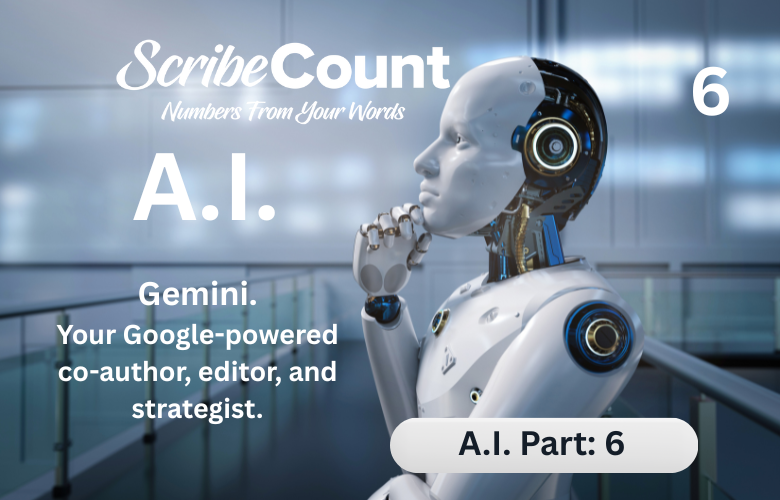Gemini for Indie Authors
Gemini, developed by Google DeepMind, represents one of the most advanced AI systems designed for multimodal reasoning, knowledge synthesis, and task execution. While it didn’t begin as a writing tool for indie authors, it has quickly become a favorite among those looking to blend fast research, draft development, idea generation, and integrated Google ecosystem capabilities. Where other AI models specialize in tone mimicry or genre-specific output, Gemini’s edge lies in its speed, accuracy, and clean alignment with how indie authors manage modern digital workflows.
For self-published authors juggling not just storytelling but also metadata, blurbs, marketing, and market research, Gemini offers a fluid way to execute creative and business-oriented tasks in the same environment. This article will walk through Gemini’s evolution, its features, and how indie authors are practically using it to support everything from writing and brainstorming to SEO and reader outreach.
Origins and Evolution: From Bard to Gemini
Gemini began its life as Bard, Google’s conversational AI model launched in early 2023 as a response to OpenAI’s ChatGPT. Bard was initially powered by LaMDA (Language Model for Dialogue Applications), but the technology quickly evolved. In late 2023, Google announced the launch of Gemini, a new foundational model family from its DeepMind division, designed to surpass traditional text-based LLMs by incorporating image, code, and audio understanding.
Spearheaded by Demis Hassabis, a neuroscientist and co-founder of DeepMind, Gemini was positioned as a more reasoning-focused model that could blend the analytical power of search with the creative flexibility of generative AI. Hassabis’ background in artificial general intelligence (AGI) and game-based learning informed much of Gemini’s development, favoring logical consistency, multimodal context awareness, and task-specific alignment.
By 2024, Bard had officially transitioned to Gemini, and Gemini Advanced—powered by Gemini 1.5 Pro—was launched with context windows up to one million tokens. The model now supports deep document analysis, nuanced copywriting, web integration, and native Google Workspace connectivity. These upgrades made Gemini an immediate contender in the writing and productivity space.
Core Features for Indie Authors
Gemini's strength lies in how well it balances creative ideation with factual precision. Unlike many other generative tools, Gemini pulls current information from the web, allowing indie authors to conduct up-to-date market research, analyze trends, and write with a deep understanding of genre shifts, reader behavior, and publishing data.
The AI can help structure novels using well-known templates like Save the Cat, the Hero’s Journey, or the Three-Act structure. It can create plot maps, suggest character arcs, and help authors develop full chapter breakdowns based on input themes, tones, or tropes. Gemini also excels at summarizing research, pulling historical context, or generating scene-by-scene comparisons between similar genre works.
Its ability to interact with Google Docs, Gmail, and Drive also means authors can create a draft in Gemini, then port it seamlessly into their preferred editing environment. This makes drafting newsletters, reader emails, author bios, press releases, and metadata entries far more efficient.
Gemini’s native coding capacity has also enabled indie developers and technically inclined authors to generate book-specific tools, such as custom HTML newsletter templates, BookFunnel landing pages, or eBook formatting scripts.
Practical Applications in the Author Workflow
Indie authors frequently turn to Gemini for early-stage ideation. When outlining a book, they use it to generate scene ideas, map emotional beats, or develop antagonists with credible motivations. Historical fiction writers use it to synthesize research across multiple sources. Romance writers use it to identify trending tropes and reader preferences on platforms like TikTok or Kindle Unlimited.
When it comes to drafting, Gemini can offer alternate phrasings, chapter transitions, or even dialogue rewrites tailored to specific character voices. Authors can input a chapter summary and ask Gemini to produce a sample scene in a chosen tone—melancholic, witty, dark, or romantic. The model’s output often serves as a launchpad for revisions.
On the business side, authors use Gemini to generate optimized book descriptions for Amazon, SEO headlines for blogs, social media captions, and comparison titles for ad targeting. It can also break down ad analytics, suggest alternate copy variations, or generate campaign ideas tailored to specific platforms like Facebook, BookBub, or Instagram.
For authors maintaining blogs or Patreon pages, Gemini assists with article planning, script development, and ongoing content calendars. Its ability to analyze user data and propose content angles makes it a quiet powerhouse in brand-building.
Integrations and Ecosystem Connectivity
What sets Gemini apart for indie authors is its integration into the Google ecosystem. It works seamlessly within Gmail, Google Docs, Sheets, and Slides—allowing authors to write, edit, format, and communicate without switching tools. For example, an author can use Gemini to generate a book launch checklist, send the checklist via Gmail to their editor, then store the conversation in Drive.
The AI also links to YouTube, Google Maps, and Google Search, providing real-time content suggestions for setting, inspiration, or marketing. Authors creating location-based fiction can pull images, descriptions, and cultural references directly into a document. Those writing nonfiction or how-to books can generate citations, data tables, and research excerpts on the fly.
Because Gemini is accessible through both web and mobile, it supports authors who draft or brainstorm on the go. Voice input and accessibility settings also make it useful for authors with alternative workstyles or mobility needs.
Pricing, Access, and Learning Curve
Gemini is available in two tiers. The free version includes the standard Gemini model with limited context memory and basic features. It is more than sufficient for most creative tasks, including writing, idea generation, and productivity.
Gemini Advanced, which runs on Gemini 1.5 Pro, is part of Google One AI Premium, priced at $19.99/month. This tier unlocks longer context memory, document upload capability, faster response times, and premium Workspace integration. For authors who use Google Docs or Gmail extensively, the upgrade provides a smoother workflow.
The learning curve is shallow. Authors familiar with ChatGPT or Bard will find the interface intuitive. Gemini is conversation-based but includes formatting tools and live previews. Tutorials are embedded, and Google’s support ecosystem includes live examples and user forums.
Most authors adapt within a single session. For those exploring deeper features like coding, database parsing, or research compilation, the help documentation is comprehensive and easy to search.
Strengths and Weaknesses for Indie Authors
Gemini’s biggest strengths are its speed, access to current information, and native Google integration. It’s an idea generator, research assistant, and productivity hub rolled into one. For indie authors wearing many hats—marketer, publisher, designer, strategist—this unified system cuts down on friction and tool-switching.
Its reasoning abilities and contextual awareness make it ideal for nonfiction writing, educational content, or worldbuilding projects where detail and consistency matter. It handles long documents well, summarizes with nuance, and understands revision instructions clearly.
Where Gemini falls short is in pure fiction generation. While it can write scenes and suggest plotlines, it is not as emotionally expressive or stylistically adaptive as Sudowrite or Claude. Its tone tends toward professional and informative, and it sometimes prioritizes coherence over creativity.
It also lacks modular fiction tools like Save the Cat beat templates or visual storyboards, which some authors prefer. While it can simulate those functions via prompts, platforms like Plottr or Novelcrafter do a better job of handling scene-level planning.
Final Thoughts: A Versatile AI for Strategic Indie Authors
Gemini doesn’t claim to be the soul of your story—but it might just be the brain behind your business. For indie authors navigating the complex world of writing, publishing, and promotion, Gemini is a multi-capable assistant that blends creativity with practicality.
Whether you’re outlining a trilogy, managing a launch sequence, building a blog series, or preparing an ad campaign, Gemini helps you move faster, think clearly, and stay focused. It won’t replace your voice. But it can amplify your process, clean your drafts, sharpen your pitches, and help you make smarter choices.
It’s a tool for authors who think beyond the page. And in that space—between creativity and strategy—Gemini shines.
Learn more at https://gemini.google.com

